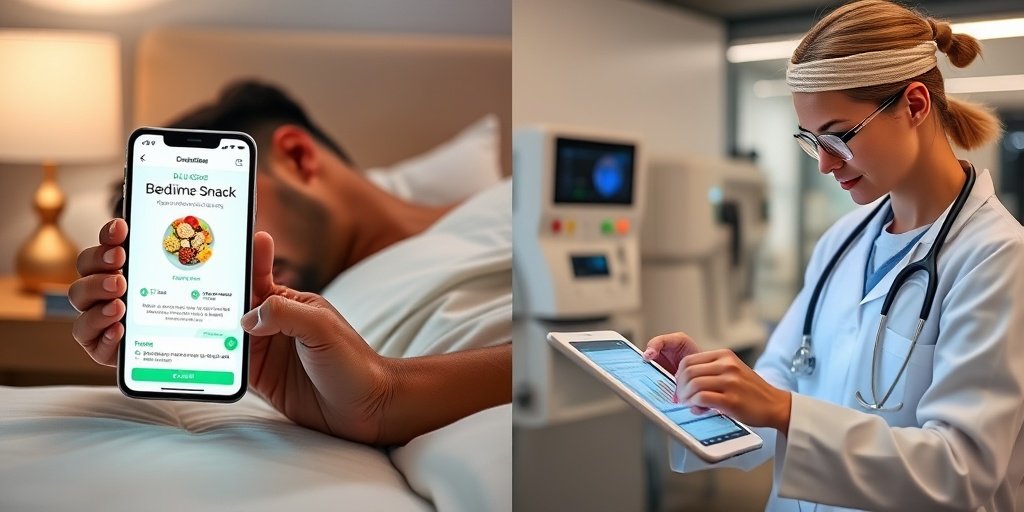⚡ Quick Summary
The DailyDose Smart Snack (DDSS) app was evaluated for its effectiveness in reducing nocturnal hypoglycemia in adults with type 1 diabetes. While it did not significantly lower the incidence of low glucose events below 70 mg/dL, it successfully reduced events below 54 mg/dL, highlighting its potential as a supportive tool in diabetes management. 🌙
🔍 Key Details
- 📊 Participants: 20 adults with type 1 diabetes (mean age 39 years)
- ⚙️ Intervention: DailyDose Smart Snack app providing personalized bedtime snack recommendations
- 🧩 Methodology: Randomized crossover trial comparing DDSS with standard care over 4 weeks
- 📈 Metrics: Continuous glucose monitoring (CGM) data collected overnight
🔑 Key Takeaways
- 🌙 Nocturnal hypoglycemia poses significant risks for individuals with type 1 diabetes.
- 📱 The DDSS app utilizes an evidential neural network for personalized snack recommendations.
- 🔍 Study design involved a randomized crossover trial for robust results.
- 📉 No significant difference was found in nights with low glucose <70 mg/dL between DDSS and control.
- ✅ Significant reduction in nights with low glucose <54 mg/dL in the DDSS group (11.9% vs. 8.3%).
- ⚖️ No compromise on other glycemic metrics, indicating safety of the intervention.
- 🧠 Insights suggest potential for technology to enhance diabetes management.

📚 Background
Managing nocturnal hypoglycemia is a critical concern for individuals with type 1 diabetes, especially those who are active or using multiple daily injections. Traditional methods of managing blood glucose levels can be insufficient, leading to the development of innovative solutions like the DDSS app, which aims to provide personalized support based on real-time data.
🗒️ Study
The study was conducted to assess the feasibility and effectiveness of the DailyDose Smart Snack app in reducing nocturnal low glucose events. Participants used the app alongside continuous glucose monitoring (CGM) for a duration of four weeks, allowing researchers to gather comprehensive data on its impact in real-world settings.
📈 Results
The results indicated that while there was no significant difference in the proportion of nights with low glucose events <70 mg/dL, the DDSS app did lead to a 3.5% reduction in nights with low glucose <54 mg/dL. This finding is promising as it suggests that the app can effectively mitigate the risk of severe hypoglycemia without negatively impacting overall glycemic control.
🌍 Impact and Implications
The implications of this study are significant for diabetes management. By integrating technology like the DDSS app into daily routines, individuals with type 1 diabetes may gain better control over their nighttime glucose levels. This could lead to improved safety and quality of life, as well as pave the way for further innovations in diabetes care. 🌟
🔮 Conclusion
The evaluation of the DailyDose Smart Snack app highlights the potential of technology in enhancing diabetes management. While it did not significantly reduce all low glucose events, the reduction in severe hypoglycemia is a noteworthy achievement. Continued research and development in this area could lead to even more effective tools for individuals managing type 1 diabetes.
💬 Your comments
What are your thoughts on the use of technology in diabetes management? Have you tried any apps or tools that have helped you? 💬 Share your experiences in the comments below or connect with us on social media:
Evaluation of a Prediction-Based Bedtime Intervention in Reducing Nocturnal Low Glucose in Adults With Type 1 Diabetes: The DailyDose Bedtime Smart Snack Crossover Study.
Abstract
OBJECTIVE: Nocturnal hypoglycemia is challenging for individuals with type 1 diabetes, particularly those who are physically active or using multiple daily injections (MDIs). We hypothesized that adding bedtime decision support to usual care with continuous glucose monitoring (CGM)-augmented MDI therapy could reduce nocturnal hypoglycemia.
RESEARCH DESIGN AND METHODS: We developed the DailyDose Smart Snack (DDSS) app, which features CGM and physical activity logging and delivers personalized bedtime snack recommendations to help prevent nocturnal hypoglycemia. Recommendations are based on the probability and timing of low-glucose events forecasted by an evidential neural network. We conducted a randomized crossover trial comparing DDSS with CGM-augmented MDI for 4 weeks each under free-living conditions to evaluate the feasibility and effect of DDSS in reducing nocturnal hypoglycemia.
RESULTS: Twenty participants completed the study (mean ± SD age 39 ± 15 years; 10 women; HbA1c 7.1% ± 1.0% [54 ± 11 mmol/mol]). There was no difference between arms in the proportion of nights with low-glucose events <70 mg/dL lasting 10+ min (control 26.0% ± 14.1% vs. DDSS 23.6% ± 15.6%; odds ratio [OR] 0.83; P = 0.207) or in overnight CGM metrics. A post hoc analysis showed that the proportion of nights with low-glucose events <54 mg/dL lasting 10+ min was significantly reduced in the DDSS arm by 3.5% (11.9% ± 12.9% vs. 8.3% ± 8.8%; OR 0.64; P = 0.040).
CONCLUSIONS: DDSS did not significantly reduce the proportion of nights with low-glucose events <70 mg/dL lasting 10+ min but reduced nocturnal low glucose <54 mg/dL without compromising other glycemic metrics.
Author: [‘Mosquera-Lopez C’, ‘Roquemen-Echeverri V’, ‘Jacobs PG’, ‘Ramsey K’, ‘Pinsonault J’, ‘Eom J’, ‘Ling H’, ‘Chen D’, ‘Branigan D’, ‘Castle JR’, ‘Hood KK’, ‘Gillingham MB’, ‘Aby-Daniel D’, ‘Wilson LM’]
Journal: Diabetes Care
Citation: Mosquera-Lopez C, et al. Evaluation of a Prediction-Based Bedtime Intervention in Reducing Nocturnal Low Glucose in Adults With Type 1 Diabetes: The DailyDose Bedtime Smart Snack Crossover Study. Evaluation of a Prediction-Based Bedtime Intervention in Reducing Nocturnal Low Glucose in Adults With Type 1 Diabetes: The DailyDose Bedtime Smart Snack Crossover Study. 2025; (unknown volume):(unknown pages). doi: 10.2337/dc25-0407